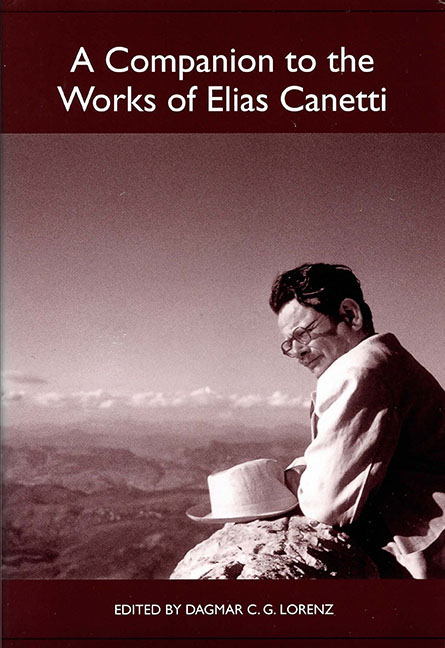Book contents
- Frontmatter
- Dedication
- Contents
- Canetti's Principal Works
- Abbreviations of Works Frequently Cited
- Introduction
- Canetti's Global Significance
- Writing and Language
- “The Deeper Nature of My German”: Mother Tongue, Subjectivity, and the Voice of the Other in Elias Canetti's Autobiography
- Elias Canetti's Attitude to Writers and Writings
- Canetti and the Question of Genre
- The Works: Themes and Genres
- Philosophy and Social Thought
- Historical Contexts
- Works Cited
- Notes on the Contributors
- Index
“The Deeper Nature of My German”: Mother Tongue, Subjectivity, and the Voice of the Other in Elias Canetti's Autobiography
from Writing and Language
Published online by Cambridge University Press: 28 April 2017
- Frontmatter
- Dedication
- Contents
- Canetti's Principal Works
- Abbreviations of Works Frequently Cited
- Introduction
- Canetti's Global Significance
- Writing and Language
- “The Deeper Nature of My German”: Mother Tongue, Subjectivity, and the Voice of the Other in Elias Canetti's Autobiography
- Elias Canetti's Attitude to Writers and Writings
- Canetti and the Question of Genre
- The Works: Themes and Genres
- Philosophy and Social Thought
- Historical Contexts
- Works Cited
- Notes on the Contributors
- Index
Summary
Ich will sie [die Erinnerung] so intakt belassen, wie sie dem Menschen, der für seine Freiheit besteht, zugehört, und verhehle nicht meinen Abscheu vor denen, die sich herausnehmen, sie chirurgischen Eingriffen so lange auszusetzen, bis sie der Erinnerung aller übrigen gleicht. Mögen sie an Nasen, Lippen, Ohren, Haut und Haaren herumoperieren, soviel sie mögen, mögen sie ihnen, wenn es denn sein muß, andersfarbige Augen einsetzen, auch fremde Herzen, die ein Jährchen länger schlagen, mögen sie alles betasten, stutzen, glätten, gleichen, aber die Erinnerung sie sollen lassen stân.
This reflection on the nature of memories is perhaps one of the most frequently cited passages of Elias Canetti's Die Fackel im Ohr. Dismissing all analytical approaches to the process of remembering — especially the psychoanalytic version — as some kind of unnecessary surgical operation, the narrator makes the case for the integrity of all memories. As many readers have noticed, the final exclamation “die Erinnerung sie sollen lassen stân” refers to a verse from Martin Luther's Eine feste burg ist unser Gott (God is our Fortress) of 1527, whose fourth stanza opens with “das Wort sie sollen lassen stahn” — just let the word be. By transposing Luther's invocation of the sacred nature of the word onto the remembering process, the narrator assumes a defiant posture that aims at safeguarding the authenticity of the individual's memories in the age of multiple and fragmented identities.
The confessional and slightly heroic tone of this passage has had considerable influence on many of Canetti's critics who write about him as if they needed to defend an anachronistic narrative that appears out of step with most leading paradigms that have shaped the reflection on self and other in the latter half of the twentieth century. A case in point is Martin Bollacher's analysis of the above-mentioned passage from Die Fackel im Ohr. Bollacher reads it as a prime example of Canetti's authoritative poetics, which aims to defend both the unbroken power of the poetic word that makes the world legible and the individual's right to favor a literal reading of one's life. The fact that the above-cited passage has become a topos in much Canetti criticism suggests that Canetti has actually succeeded in exercising considerable authority over the reception of his works, thus canonizing a model of subjectivity that appears to favor the power of the autonomous subject.
- Type
- Chapter
- Information
- A Companion to the Works of Elias Canetti , pp. 45 - 60Publisher: Boydell & BrewerPrint publication year: 2004

